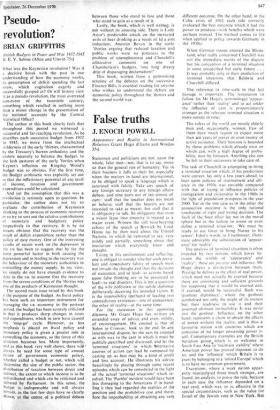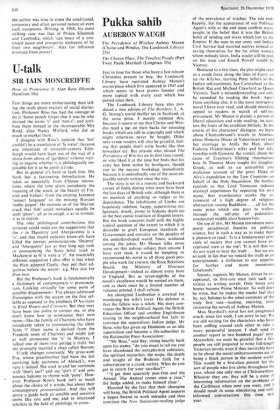False truths
J. ENOCH. POWELL
Appearance and Reality in International Relations Grant Hugo (Chatto and Windus 35s) Statesmen and politicians are not, upon the whole, false men—not, that is to say, more so than the general run of humanity. Yet in their business it falls to their lot, especially when the matters in hand are international, to be obliged to speak a language which is saturated with falsity. Take any speech of any foreign secretary in any foreign affairs debate, and nine parts out of ten consist of cant: stuff that the speaker does not mean or believe; stuff that the hearers are not intended to take as meant; but stuff that it is obligatory to talk. So obligatory that even a minor lapse into sincerity is treated as a major event. Witness the still reverberating echoes of the speech at Berwick by Lord Home- (as he then was) about the United Nations, in which he ventured to say, very mildly and partially, something about that institution which everybody knew and thought.
Living in this environment and reflecting, one is obliged to wonder whether such preva- lent and compulsory falsity of speech must not invade the thought and thus the decisions of statesmen, and so lead—as actions based upon false thinking are to be presumed to lead—to real disasters. This is not a question of the wily politician or the subtle diplomat deliberately deceiving his intended victim. It is the impossibility (perhaps) of leading two contradictory existences—one of appearance, the other of reality—at the same time.
For the statesman in this agonising dilemma Mr Grant Hugo has written an extended essay of advice and even, mildly, of encouragement. His counsel is that of Solon to Croesus: look to the end. In any international dispute, let the ears be stopped as with wax to the cant in which it must be publicly .described and discussed, and let the 'terminal situations' to which ghlternative courses of action can lead be compared by casting up, as best may be. a kind of profit and loss account. He illustrates his advice beguilingly by playing through some recent episodes which can be considered in the light of the actual 'terminal situations' which re- sulted. The 'Pueblo' incident would have been less damaging to the Americans if in hand- ling it they had regarded the realities of the position and the prohibitive cost and there- fore the improbability of obtaining any very
different outcome. On the other hand, in the Cuba crisis of 1962 each side correctly evaluated the best outcome which it had the power to produce—with benefits which were perhaps mutual. The method comes to life when applied to policy towards Germany in the 1930s: When German troops entered the Rhine- land, what really concerned Churchill was not the immediate merits of the dispute but his conception of a terminal situation in some unspecified but early future . . . It was probably only in their prediction of terminal situations that Baldwin and Churchill differed.
The reference to time-scale in that last passage is important. The temptation to follow (in Mr Hugo's terminology) 'appear- ance'• rather than 'reality' and to act under the influence of cant is proportionately stronger as the relevant terminal situation is more remote in time: The rulers of the world are mostly elderly men and, occasionally. women. Few of them have much reason to expect more than sen years of power or even twenty of active existence. Their horizon is bounded by those problems which already exist or which can, with a high degree of proba- bility, now be foreseen. Anything else can be left to their successors to take care of.
The task of Churchill in attempting to bring a terminal situation which, if his predictions were correct, lay only a few years ahead, to bear upon policies of rearmament and alli- ance in the 1930s was enviable compared with that of trying to influence policies of immigration and citizenship in the 1960s in the light of population prospects in the year 2000. Yet in the one case as in the other the prospective outcome is the only rational touchstone of right and wrong decision. The fault of the Suez affair lay not in the moral sphere but in the failure to assess or even define a terminal situation: 'We must be ready to use force to bring Nasser to his senses', Eden's words to Eisenhower, illum- inate admirably the substitution of 'appear- ance' for 'reality'.
The analysis of terminal situations is often impeded by two notions which hover be- tween the worlds of 'appearance' and 'reality': these are prestiv and influence. Mr Hugo draws a distinction between them. Prestige he defines as the effect of real power, which need not actually be exerted because there are continuing and sufficient grounds for supposing that it would be exerted and, if exerted, would be successful. Such was 'gunboat diplomacy', where the gunboat symbolised not only the might of its owners but their readiness to use it and their assumed -ultimate invincibility. It was never just the gunboat. Influence, on the other hand, represents a claim to obtain the effects of power without the reality, and is thus a favourite notion with countries which are conscious of no longer possessing power it- self. Contemporary examples are the British battalion group. which is so welcome in South-East Asia to 'maintain. stability' where American power has proved impotent to do so, and the 'influence' which Britain is to exert by belonging to a 'united Europe' which is to have no common government.
Exceptions, where a weak nation appar- ently manipulated those much stronger, are found. on analysis. to prove the rule, because in each case the influence depended on a real card, which was, or is. effective in the special circumstances, such as the value for Israel of the Jewish vote in New York. But the author was wise to stress the conditional, temporary and often personal nature of even such exceptions. Writing in 1968, his most striking case was that of Prince Sihanouk and Cambodia, which 'can boast of a con- tinued peace and prosperity undreamt of by their two neighbours'. Alas for influence divorced from power!



















































 Previous page
Previous page